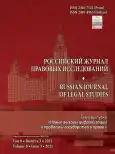Factors of Formation of Tax Behavior and Tax Culture at the National Level
- Authors: Seliutina T.S.1
-
Affiliations:
- Financial University under the Government of the Russian Federation
- Issue: Vol 8, No 3 (2021)
- Pages: 97-104
- Section: Law and Economy
- URL: https://journal-vniispk.ru/2410-7522/article/view/75987
- DOI: https://doi.org/10.17816/RJLS75987
- ID: 75987
Cite item
Abstract
This article is devoted to issues of national tax system effectiveness and overcoming existing problems with it. Under the current conditions, taxes are the integral lever of government influence on the country’s market economy. As a result, the level of development of the national economy and the conditions in its social sphere are directly influenced by the state of the tax system. The author considers it possible to ascertain the efficiency of the tax system in the broadest sense, namely as an aggregate level of achievement, by its goals. Those goals are set in accordance with the functions of taxation. However, when they are realized, significant disparities and even narrowed interpretations of functions arise. As a result, the existing tax system is flawed and unable to achieve high operational efficiency. As one of the most important problems, the author singles out the problem of incomplete fiscal performance due to insufficient tax discipline arising from a low level of tax culture. The author offers a proprietary interpretation of the factors influencing the specific actions of tax decision makers. From the point of view of tax culture, they are divided into factions that make up the tax culture, factions formed and determined by the prevailing tax culture, and others developed under the influence of alternate circumstances. The author considers the most complete and logical understanding of tax culture to be the level of citizen awareness of the importance of taxes as a source of financing the existence of the state and the performance of its functions. With this interpretation, it is justified to assume that citizens compare the degree of decline in their levels and quality of life due to their taxes, and increases in the quality of their lives by means of the implementation of social and other public functions. The prevalence of the latter leads to increased tax discipline…and the former to its decrease. Although these assessments are always subjective, they can serve as bases for the formation of objective directions for improving the activities of tax authorities and educational institutions and, by extension, the tax discipline of citizens and the business community. The effects are economically measurable and long-term.
Keywords
Full Text
##article.viewOnOriginalSite##About the authors
Tatiana S. Seliutina
Financial University under the Government of the Russian Federation
Author for correspondence.
Email: Tatiana-selyutina@yandex.ru
candidate of economic sciences
Russian Federation, MoscowReferences
- Suvorina NV, Zhurkina TA. Problems of maintaining business activity of an enterprise. Political economic problems of the development of modern agroeconomic systems. proc.conf. 2019. P. 129–133. (In Russ.).
- Tovchenko RB, Radaev KD. Problems of tax collection at the current stage of development of the Russian Federation. Bulletin of the International Market Institute. 2019;(2):107–112. (In Russ.).
- Kogteva AN. Risks of the credit system of the Belgorod region. Economic security: problems, prospects, development trends. proc.conf. Perm’ state national research university. 2019. P. 157–164. (In Russ.).
- Jushaeva RS. Actual problems of the Russian tax system. Scientific and methodological electronic journal "Concept". 2015;(13):3546–3550. (In Russ.).
- Ivanova SA. Tax and taxation. Moscow: Juniti, 2011. 211 p.
- Rutskaya EA. Factors in the formation of the tax culture. Problems of modern science and education. 2017;22(104):103-107. (In Russ.).
- Bychkova EJ. Tax culture as a component of professional training of artisan entrepreneurs. Corporate culture of educational institutions (formation of general cultural competencies of future specialists): proc.conf. November 16–17, 2010, Ekaterinburg / Russian state professional teachers’ training university. Ekaterinburg, 2010. P. 30–34. (In Russ.).
- Korobkov EV, Sabetova TV, Shishkina LA. Formation of the students’ competences in the area of analysis of the reporting of organizations while teaching the disciplines of economic and managerial group. Modern economy: problems and solutions. 2020;3(123):81–89. (In Russ.).
Supplementary files












